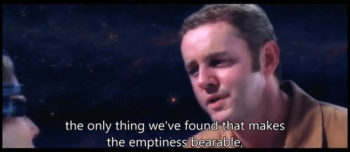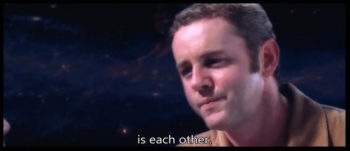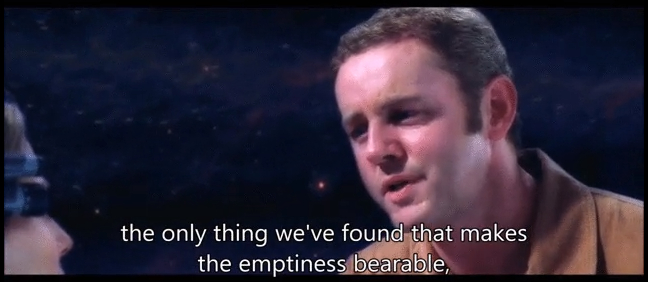What Aliens Teach Us About God, part 6: Aliens as Substitute for Knowing God
SETI, the Search for Extraterrestrial Intelligence, was the backdrop of the 1997 movie Contact, where the desire to find intelligent alien life in the cosmos via radio messages actually finds an alien signal–which in turn gives instructions on how humans can build a machine that in the story projects the protagonist to another star system. Where she meets a benevolent and paternal alien.
Contact, twenty years old now, is unique in that it was based on a fictional novel written by a prominent astronomer, Carl Sagan, and adapted into a movie. Since there are no other science fiction stories by astronomers adapted into movies that I know of, perhaps that explains why no other film has expressed so clearly the deep longing to find extraterrestrials that some humans today feel. The satisfaction of that longing is expressed in a memorable scene from Contact summarized in the two pictures below, but which also can seen in an imgur.com post I’ve linked:

In this scene, an alien manifests itself in the image of the main character’s (late) father and discusses how meeting other alien species gives deep meaning to their existence. Doing so, “makes the emptiness bearable,” the-alien-in-the-form-of-daddy explains.

I think Carl Sagan meant the emptiness of the vastness of space with this line on making “emptiness bearable,” but it’s easily possible to see much more in that statement. Which of course reflects not how aliens feel, but how Sagan himself and many other among our race feel about meeting aliens. SETI isn’t just a matter of mere curiosity for some people. For some, the desire to meet aliens expresses a deep emotional longing–a response to pondering a vast universe only inhabited by us humans, which fills them with a sense of intense loneliness–or even dread.
Since I believe this deep longing that inspires SETI is very real and important to many people, I expected when writing this post that there would more recent movies than Contact on this theme that I’d simply never seen or wasn’t thinking of. I searched for them, but I could not find any as clear on this topic as Contact was, though Star Trek: First Contact and some other films have touched on this. Perhaps this is mostly because not many movies are written by astronomers–though I believe there’s likely another reason why we don’t see many movies that openly express a deep longing to meet extraterrestrials, a reason I will bring up again in a bit.
First it’s important to mention I found plenty of evidence of people taking about this issue in a way that parallels Contact. But they’re mostly talking about it in non-fiction formats, in YouTube documentaries and in books such as Paul Davies’ Are We Alone?: Philosophical Implications Of The Discovery Of Extraterrestrial Life. Or in TED talks, such as a TED talk on SETI by Jill Tarter in 2009, in which the she offered the following statement (starting about 4 minutes from the end): “The discovery of intelligent life beyond Earth would eradicate the loneliness and solipsism that has plagued our species since its inception. And it wouldn’t simply change everything, it would change everything at once.”
So the kind of people talking about this issue are the “nerds” who are into pondering the ultimate nature of the universe (which is the kind of nerd I am), people who are not merely curious to find intelligent alien life. Many if not most also believe that SETI can profoundly transform the human race. These serious astronomers and philosophers of the cosmos, at least some of them, look to aliens as a means to eliminate what I could call the “cosmic loneliness” of our species.
Yet if this is such a big deal for many, why isn’t it reflected in fiction more often? Why doesn’t science fiction ask the question, “Are we alone?”–that is, the only intelligent species in the universe–more often?
Maybe it’s because Guardians of the Galaxy, Men in Black, Star Wars, Star Trek and so many more science fiction stories have in effect already answered the question: “No, we are not alone–aliens are everywhere.” Maybe in the popular imagination it’s not necessary to pine for the discovery of aliens to alleviate our cosmic loneliness, because aliens are for the most part already accepted as existing. Any sense that a vast, empty universe would be disturbing is alleviated before it even forms, by ubiquitous fictional aliens.
Please note that I do rather agree that the idea of a vast universe only inhabited by human beings would be depressing if not disturbing–but the universe is not empty other than us. The presence of God permeates every place that exists, just as God is available to all who seek him from any place here on Planet Earth. If somehow we humans were able to travel to each and every one of the 100 billion or so galaxies known to exist, we would not be truly alone in any of them, even if we never find any extraterrestrial intelligent life there, because the spirit of God is in all of those places.
By the way, I should mention here that I do not know if intelligent aliens exist or not–I don’t feel I have enough evidence to know either way. Note that I am not one of those Christian thinkers who eliminates the existence aliens in advance. On the contrary, in a blog post of mine on aliens I argued just the opposite, saying that I believe aliens can in fact exist.
But I am not very much troubled by the question–I would not be disturbed if there are no intelligent aliens–if SETI never succeeds. Because whether there are aliens or not, the universe is not empty. God is there.
The desire that some people feel, a desire for a connection with something other than humanity, the urge to meet aliens, I think is in fact a substitution for the innate desire God put in people to know him and seek to understand him. These people feel despair at the thought of an empty universe–yet that thought should cause them to think about God. They feel longing to contact a mind that is unlike the human mind–never realizing that God is in many key ways not like a human being.
What they are really unknowingly longing for is a relationship with the transcendent God of the Bible. Not with the overly-simplified (and tamed) God of some people’s imaginations, an old man with a beard sitting on a throne, a sort of Santa Claus in space, but with the real God, the one who invented both relativity and quantum mechanics. The one who can think in ways we can make sense of and in ways we will never grasp. The One who is beyond us. Who is transcendent. And yes, who is everywhere–even in the most distant galaxies.
In the next (and last) installment of this series I will drive home the practical application, the “so what” of the idea of that fictional aliens teach us important things about God.
But in the meantime, what do you think about this topic? Do you think SETI is a substitute for a search for God? Do you believe aliens have replaced God in the popular imagination? Other thoughts?











































Great article Travis.
I do think SETI is a substitute for the search of God. In our questions about aliens, we do inherently recognize, as you’ve mentioned previously in past posts, that the aliens would be flawed. We understand that, if and when, we discover these other aliens, we know, for a certainty, that they will be flawed. They will be finite, and they will imperfect.
In other words, we’re simply looking for ourselves ‘out there’. Sure the skin may be leathery, or scaly, four arms, three legs, whatever. We’re not really looking to ‘fill the loneliness’ as some would. We’re looking to confirm that our flaws are replicated elsewhere. That in not being alone, we’re not really special.
Why would we really want to think that we’re not special? What harm is there in acknowledging that we are special?
Unlike some people, if I were to find out there were no other life in the universe, and mind you, I hold the same stance as you do about there can be, I think it would further show JUST HOW SPECIAL WE ARE. That this great, vast universe belongs to us. This is our kingdom. Our home. And no one can take it from us. That God made it JUST FOR US! This is for you and only you because there’s no one else like you.
And, as you’ve so adequately and beautifully pointed out throughout this series, the aliens we’re hoping to meet, and create treaties with, are not really alien. God, in His perfection, holiness, wisdom, power, is truly ALIEN. Under the light of His glory, what we are becomes apparent — broken, flawed, sin-filled. Due to his ALIEN nature — His love, His judgment, His wrath, His forgiveness, and His patience, we are left to think “Why would He create me or be bothered with me? What makes me so special?”
And yet, we are! He didn’t stay in heaven and leave us alone. His presence permeates every faucet of creation. He became like us and still remained completely true to Himself.
Think about it. People who are critical of theism, in particular Christianity, often say, “Well if God is this what about X? If God is so good, what about Y?” Because we know that God is truly ALIEN from us. If we can, in some way, attempt to bring Him down to our standards, then it would be ‘okay.’
I’ll tell you what: in our fiction, and our reality for that matter, we can do atrocities of epic proportions. We recognize that these things are wrong. How do we recognize it? Because of the ALIEN presence of our God and King. The light of Him shines through and we can see it and understand it.
So yeah, we don’t want to search for the truly ALIEN presence of God. We’re simply looking for people just like us to let us feel comfortable in our brokenness. And yet, we do understand that if we do, there will simply be more wars, more things that go wrong. It’s a given that if we do find these aliens, they’re going to be like us.
Misery loves company as the colloquial goes.
My kids and I have this conversation whenever they play Spore. Where did that crystal meteor come from with the living squiggly thing already inside? Who made it?
But yeah, people don’t want to believe in God. God probably has rules and laws and morality. We want aliens who will applaud our sinful life and lead us into even more wonders of immorality that we’ve barely even imagined.
I was listening to the theme song of Destiny by Paul McCartney (Hope for the Future). It basically paints a picture where mankind will find heaven and redemption out there among the stars, but we’ll do it ourselves. It’s quite the anthem to humanism, but it’s also so sad.
A related question: is that also behind our urge to anthropomorphize and/or keep pets? There’s that bit in CS Lewis’s space trilogy about the Martian species don’t keep pets because they have each other, but he also said they that they joke more between species than among their own, and that seems weird to me on second thought. I have more inside jokes with my husband and family than I do with, say, people at work.
I watched some science show about how people were trying to communicate with dolphins. The part I found interesting is that they used the idea of a pidgin language, ’cause linguistics showed that pidgin languages were the way that different human populations communicated with each other.
Of course, I have this on a smaller scale in my own home with my cats. My black floofbeast communicates mostly in chirps, while the experienced Oldcat is expert at “since you’re already up” requests (meaning she tries to murder us by running around our legs when we’re walking somewhere). In fact, cats only developed a meow to communicate with people.
And this got really tangential, but this is a cool subject and one we can experiment with in our own homes. I’ve certainly tried to train (ie, refine our pidgin code) the cats to get our attention with something less annoying than jumping on the TV shelf, where they are not allowed.
So true, Travis. So sadly, sadly true. Anything but the only real God. Great work.